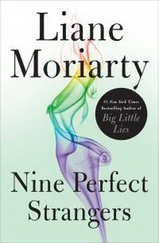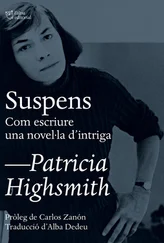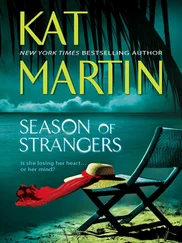“He always comes by. He always telephones.”
“Why?”
“He slept here!” Guy burst out, then he saw Anne’s recoil in the subtle lift of her head, the flicker of her lashes.
“Yes. Night before last,” her steady voice challenged him. “He came by late, and I asked him to stay over.”
It had crossed his mind in Canada that Bruno might make advances to Anne, simply because she belonged to him, and that Anne might encourage him, simply because she wanted to know what he had not told her. Not that Bruno would go very far, but the touch of his hand on Anne’s, the thought of Anne permitting it, and the reason for which she would permit it, tormented him. “And he was here last evening?”
“Why does it bother you so?”
“Because he’s dangerous. He’s half insane.”
“I don’t think that’s the reason he bothers you,” Anne said in the same slow steady voice. “I don’t know why you defend him, Guy. I don’t know why you don’t admit he’s the one who wrote that letter to me and the one who almost drove you insane in March.”
Guy stiffened with guilty defensiveness. Defense of Bruno, he thought, always defense of Bruno! Bruno hadn’t admitted sending the letter to Anne, he knew. It was just that Anne, like Gerard, with different facts, was putting pieces together. Gerard had quit, but Anne would never quit. Anne worked with the intangible pieces, and the intangible pieces were the ones that would make the picture. But she didn’t have the picture yet. It would take time, a little more time, and a little more time to torture him! He turned to the window with a tired leaden movement, too dead even to cover his face or bow his head. He did not care to ask Anne what she and Bruno had talked of yesterday. Somehow he could feel exactly what they had said, exactly how much more Anne had learned. There was some allotted period of time, he felt suddenly, in this agony of postponement. It had gone on beyond all logical expectation, as life sometimes did against a fatal disease, that was all.
“Tell me, Guy,” Anne said quietly, not pleading with him now, her voice merely like the tolling of a bell that marked another length of time. “Tell me, will you?”
“I shall tell you,” he replied, still looking at the window, but hearing himself say it now, believing himself, such a lightness filled him, he was sure Anne must see it in the half of his face, in his whole being, and his first thought was to share it with her, though for a moment he could not take his eyes from the sunlight on the window sill. Lightness, he thought, both a lifting of darkness and of weight, weightlessness. He would tell Anne.
“Guy, come here.” She held up her arms for him, and he sat beside her, slipped his arms around her, and held her tight against him. “There’s going to be a baby,” she said. “Let’s be happy. Will you be happy, Guy?”
He looked at her, feeling suddenly like laughing for happiness, for surprise, for her shyness. “A baby!” he whispered.
“What’ll we do these days you’re here?”
“When, Anne?’
“On—not for ages. I guess in May. What’ll we do tomorrow?”
“We’ll definitely go out on the boat. If it’s not too rough.” And the foolish, conspiratorial note in his voice made him laugh out loud now.
“Oh, Guy!”
“Crying?”
“It’s so good to hear you laugh!”
Forty-five
Bruno telephoned Saturday morning to congratulate Guy on his appointment to the Alberta Committee, and to ask if he and Anne would come to his party that evening. Bruno’s desperate, elated voice exhorted him to celebrate. “Talking over my own private wires, Guy. Gerard’s gone back to Iowa. Come on, I want you to see my new house.” Then, “Let me talk to Anne.”
“Anne’s out right now.”
Guy knew the investigations were over. The police had notified him and so had Gerard, with thanks.
Guy went back into the living room where he and Bob Treacher were finishing their late breakfast. Bob had flown down to New York a day ahead of him, and Guy had invited him for the weekend. They were talking of Alberta and the men they worked with on the Committee, of the terrain, the trout fishing, and of whatever came into their heads. Guy laughed at a joke Bob told in French-Canadian dialect. It was a fresh, sunny November morning, and when Anne got back from her marketing, they were going to take the car to Long Island and go for a sail. Guy felt a boyish, holiday delight in having Bob with him. Bob symbolized Canada and the work there, the project in. which Guy felt he had entered another vaster chamber of himself where Bruno could not follow. And the secret of the coming child gave him a sense of impartial benevolence, of magical advantage.
Just as Anne came in the door, the telephone rang again. Guy stood up, but Anne answered it. Vaguely, he thought, Bruno always knows exactly when to call. Then he listened, incredulously, to the conversation drifting toward the sail that afternoon.
“Come along then,” Anne said. “Oh, I suppose some beer would be nice if you must bring something.”
Guy saw Bob staring at him quizzically.
“What’s up?” Bob asked.
“Nothing.” Guy sat down again.
“That was Charles. You don’t mind too much if he comes, do you, Guy?” Anne walked briskly across the room with her bag of groceries. “He said Thursday he’d like to come sailing if we went, and I practically invited him.”
“I don’t mind,” Guy said, still looking at her. She was in a gay, euphoric mood this morning, in which it would have been difficult to imagine her refusing anybody anything, but there was more than that, Guy knew, in her inviting Bruno. She wanted to see them together again. She couldn’t wait, even today. Guy felt a rise of resentment, and said quickly to himself, she doesn’t realize, she can’t realize, and it’s all your own fault anyway for the hopeless muddle you’ve made. So he put the resentment down, refused even to admit the odium Bruno would inspire that afternoon. He determined to keep himself under the same control all day.
“You could do worse than watch your nerves a bit, old man,” Bob told him. He lifted his coffee cup and drained it, contentedly. “Well, at least you’re not the coffee fiend you used to be. What was it, ten cups a day?”
“Something like that.” No, he had cut out coffee entirely, trying to sleep, and now he hated it.
They stopped for Helen Heyburn in Manhattan, then crossed the Triboro Bridge to Long Island. The winter sunlight had a frozen clarity at the shore, lay thin on the pale beach, and sparkled nervously on the choppy water. The India was like an iceberg at anchor, Guy thought, remembering when its whiteness had been the essence of summer. Automatically, as he rounded the corner of the parking lot, his eye fell on Bruno’s long, bright blue convertible. The merrygo-round horse Bruno had ridden on, Guy remembered Bruno saying, had been royal blue, and that was why he had bought the car. He saw Bruno standing under the shed of the deckhouse, saw everything of him except his head, the long black overcoat and the small shoes, the arms with the hands in the pockets, the familiar anxiety of his waiting figure.
Bruno picked up the sack of beer and strolled toward the car with a shy smile, but even at a distance, Guy could see the pent elation, ready to explode. He wore a royal-blue muffler, the same color as his car. “Hello. Hello, Guy. Thought I’d try and see you while I could.” He glanced at Anne for help.
“Nice to see you!” Anne said. “This is Mr. Treacher. Mr. Bruno.”
Bruno greeted him. “You couldn’t possibly make it to the party tonight, Guy? It’s quite a big party. All of you?” His hopeful smile included Helen and Bob.
Читать дальше












